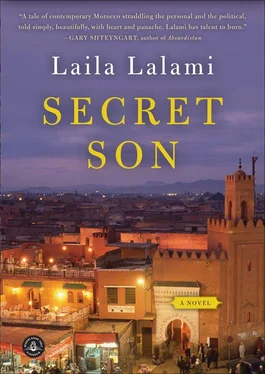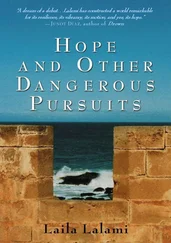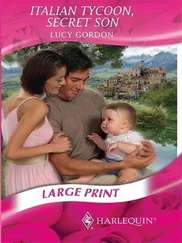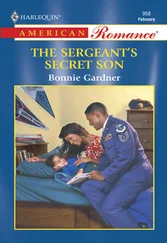“It’s not that I don’t believe you, my son,” she said defeatedly. “It’s that I don’t believe them.”
“What is that supposed to mean? Are you saying you don’t want to move?”
“Move? Of course not. We have a house, it’s ours, and I’m not about to give it up.”
“You call this a house?”
She took the insult in silence. She put the fabric, thread, and thimble in her basket and went to lie down in the bedroom, facing the wall.
Youssef followed her. “Tell me,” he pleaded.
“What is there to say? You obviously want to go.”
“Of course I want to go. My father wants to take care of me — of us. Don’t we deserve it, after everything we’ve been through?”
“Life doesn’t work that way. It’s not about what you deserve or what you don’t deserve.”
“Then what is it about?” he asked, folding his arms.
She turned around to face him. “It’s about doing what you think is right without expecting a reward for it. These people never wanted to do the right thing. Your grandmother threw me out on the street when I told her I was pregnant. She called me a whore. She threatened to call the police if I didn’t leave. I swear to God, she would have killed me if she thought she could get away with it. And where was your father? He was attending some rally or other. Not once in the past twenty years did he come looking for me or for you. And now that you’re a young man, now that you’re a college student with a bright future ahead of you, all of a sudden he wants to help you. And you believe him.”
“Why shouldn’t I? What his mother did wasn’t his fault.”
“Have you asked yourself what his wife will say when she finds out about you? What his brothers will do? Do you think they will welcome a son into their midst? Someone who has a claim to the inheritance? Wake up, my son. Wake up.”
Youssef shook his head. “Let’s not get ahead of ourselves. We have the apartment — that’s already something.”
She screamed out of frustration. “I don’t want his cursed apartment. You can have it if you want. But I’m not moving.”
“Why are you so stubborn?” he asked. She did not answer, and her silence infuriated him. Before he knew it, the accusation flew out of his mouth: “Why him? He was already married! And his wife was pregnant!”
In her eyes was a shame he had not seen in their previous arguments. It was this detail she was embarrassed by, nothing else.
“Come with me,” he said more softly.
“No. I’m not going anywhere. You’re embarrassed to live here with me. Iwa, now is your chance to find out what life’s really like. Go ahead and go.”
Until now, Youssef had not known how to feel about his father’s gift, much less about his intentions, but his mother’s outburst had gotten the better of him. Now he had no choice but to leave. He walked out, slamming the door behind him. It was all her fault, he thought. All of it. Why didn’t she have an abortion? Why did she have to bring him into this world, to live like this? Was this the kind of life she wanted for him? Or for herself? He shoved his right hand into his pocket. His fingers touched the key, turning it around and around.
YOUSSEF STOOD UNDER the shower until the water turned cold. Wrapping himself in the thick blue towels he had found neatly stacked in a cabinet, he sat on the side of the bathtub, staring at the bidet. His mother had told him about these fixtures, but he had never seen one before. When he felt warm enough to cast aside the towels, he dressed in yesterday’s clothes; he had stormed out of the house without packing anything. Perhaps he would go back today, when his mother was at work. If he came and went unseen, then his mother could tell whichever story suited her best to justify his absence. He wanted to make his departure from her life as easy as his entrance into it had been difficult.
There was no food in the kitchen, but he found some coffee. He carried a hot mug to the balcony and lit a cigarette. The street below was quiet: no bicycle bells or car horns, no piercing cries of children playing football. A brown falcon with a twig in its beak flew to the roof of a building on the right. For over an hour, Youssef watched the bird’s comings and goings, fascinated by its color and shape. Back home, he only saw pigeons and sparrows, which spent as much time on the ground as in the air. The falcon was graceful and precise, swooping down and pulling back up at great speed. When it finally settled down, Youssef went back inside the apartment.
Out of boredom, he went to the larger bedroom, which faced his own across the corridor. The armoire contained a few button-down shirts, trousers, and ties. On the nightstand was a week-old newspaper, folded to the business section, and two books of poetry. Nothing exciting. He opened the drawer; there, nestled between hand towels, was a pack of condoms. The old dog, Youssef thought — he is using this apartment for meeting women. Women like my mother. What am I doing here? What am I doing with this man who is still cheating on his wife after all these years?
He put on his shoes and left the apartment. On the third floor, he nearly ran into a middle-aged woman carrying three baguettes. He flattened himself against the wall to let her pass. “Good morning,” she said, walking past him and sizing him up quickly as she did so. When he got to the ground floor, the doorman jumped to his feet to greet him, but, afraid of being asked what he was doing in the building, Youssef ran out without saying a word. Who did he think he was fooling? Anyone here would know that he was an outsider.
He walked down the wide street and turned right, away from the gurgling water fountain at the roundabout. Doormen were sweeping the tiled sidewalks outside their apartment buildings or washing the cars parked in front. There were no hanouts, but there was a giant supermarket with a garish blue and yellow sign. Stores were everywhere, selling everything from toys to furniture, from electronics to lingerie. It surprised him that there were no young men his age standing around at street corners. Where were they all?
Hunger made him stop in front of a fancy patisserie called L’Abeille au Bois Dormant. A little boy dressed in a sailor suit kept tugging at his father’s shirtsleeve and pointing at a millefeuilles in the display case. The mother patted his head and said something to him, and he grinned. Youssef stared at the family until his eyes glazed and he saw his own reflection in the windowpane instead. Slowly, the urge to go back home began to dull. He did not miss the smell of garbage or the sight of cows grazing on trash. Nor did he miss collecting water at the fountain. What he did miss: having a father. Nabil had not chosen the name Youssef when he was born, or danced at his circumcision ceremony, or taken him to the hammam when he was old enough, or taught him how to ride a bicycle.
Now there was a chance that the emptiness that had been the hallmark of his life could be filled. The future was uncertain, but at least he could see the glimmer of a future — except that he had run away from this new beginning, and all because of a pack of condoms. So what if his father brought women to the apartment? No one was forcing them to come. Youssef felt around in his pocket for his last remaining twenty-dirham bill, and then he walked inside the patisserie and asked for a croissant.
“YOU SHOULD HAVE CALLED,” Nabil said, his voice rising with excitement. “I didn’t know you were here, or I would have come earlier.”
“I wasn’t sure …” Youssef said, rising from his seat. He did not know what he had been unsure about. His father did not ask.
“Have you eaten?”
Читать дальше












